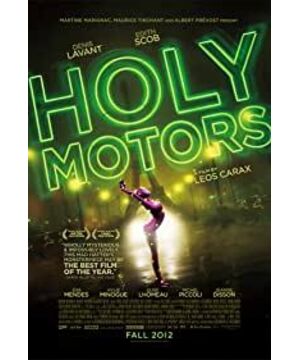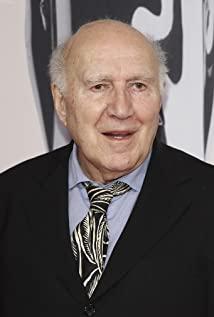Author: Fernando Ganzo Translator: Olafisaac
After watching "Sacred Cars" twice, I have been thinking about where this pleasure comes from. I don’t think of it as a nostalgia or a "tribute to the film", as everyone said at the Cannes Film Festival ("the purest film", and all such expressions that are mentioned when awarding film festival awards. Way). We know that we are the illegitimate children of the movie. If we mention true movie fans, we cannot regard ourselves as their brothers, because we were born too late, in a world that does not belong to us, and we cannot understand the world in the same way. So, in a sense, we all like to see Dad on the ground's underwear and imagine him being raped in his most luxurious room. This pleasure comes from the destructive impulse hidden in each stage of the character's experience in the movie, as well as its heretical power. However, if these images do not retain the qualities of pure film images, it is not the same thing (Karax has always stood on the side of "beautiful images", that is, Murnau's camp, if you want to think so); This is a boundary that Cai Mingliang crossed with "Face", and at the same time he had to pay a fatal price for it.
In a sense, "Sacred Cars" is Karax's unique interpretation of Bonello's "Infatuation." In this film, we have a character named after the director (Mr. Oscar, we know Leos Carax = Alex Oscar, which is his real name), and he has to go through several stages, just like playing a video game. If these two films both have such a clear statement about their authors, it is because the protagonist is struggling to get through these stages to be happy in our time (Ponilo movie), or to make a movie (Carax movie) . Mr. Oscar worked hard to play different roles. He rehearsed various roles in Edith Skobo's luxury car touring Paris. He did it in a way that was similar to the movie's exhaustion to obtain CNC (World Film Support Program) financial assistance. of. Nowadays in France, it is impossible to refuse financial assistance for "Sacred Cars". Why? Because it contains all the elements they want to see in an author's film; and Karax expresses it mercilessly, which almost distorts the usual ambiguous ambiguity of these performances (beauty/parody) . Namely: social movies (Mr. Oscar plays a foreign beggar in Paris), Hollywood action movies (Mr. Oscar plays a sudden killer), authorial self-fiction (Mr. Oscar plays the appearance of a Carax People who made noises when his daughter took him home), peculiar digital animations (fragments of Mr. Oscar’s capture of the action), ambiguous and nondescript naturalistic stories (Mr. Oscar played a dying old man who was killed by his young lame niece) Take care); even a musical interlude as a "vitalizing purpose" for all French pre-production films; the appearance of Mr. Mai De (Merde in French, meaning "shit") from Tokyo was made for this short film by different directors Hybrid movies have added another genre; no one knows why these clips are done, but it seems that there is always money to be made, and Mr. Caraxes knows this very well.
The clever trick of the film is that the boundaries that enclose different representations gradually become blurred. In the first part, a somewhat funny ellipsis brought us back to the luxury car. But as the movie progresses, we gradually dive into the content of the ellipsis, it is difficult for us to determine whether Mr. Oscar is acting or everything is happening "real". When all this happened "real", we felt that Karax himself was talking through Mr. Oscar in the first-person singular way.
His boss, or the producer (in short, the mysterious person in charge in the limousine) suddenly appeared on the opposite seat. It's Michelle Piccoli. In the following dialogue, Mr. Oscar said:
-In the beginning, the camera was heavier than us. Later they became smaller than our heads, and now we can't see them at all. -The gangsters in the suburbs also don't look at the surveillance cameras, but that doesn't mean they are unaware of them. (...) I also became a little suspicious. For example, I will believe that one day I will die. (...) Have you ever envisaged quitting? Why are you still here? -Just like the reason that drove me at the beginning: the beauty of posture. (Chinese subtitles are translated here as the beauty of performance, translator's note)-but they say that beauty is hidden in the eyes of the audience. -What if there is no audience anymore?
Narrative tragedy: Mr. Oscar is constantly being filmed; his life is like an endless performance in which he is trapped like Chaplin's role in the factory. Movie tragedy: If there is no audience watching it again, but at the same time the images are pervasive, so Caraxes, who was spoiled forever, agrees to be a good boy and pass all the tests, but he has to assume a revival-like, "fighting over the universe". Tragedy. Or maybe we attribute the cause to the current situation. Especially in such a scene, Mr. Oscar becomes a killer, driving his luxury car through the Champs Elysées. Suddenly, he abruptly asked the driver to stop and stepped out of the car fully armed, his face hidden under a mask covered with barbed wire. He walks to Fouquet's restaurant (the restaurant where Nicolas Sarkozy officially celebrated his victory in the election five years ago). At that moment in the movie, I was sure that he was going to kill Sarkozy, but he entered the restaurant and killed the rich banker he himself played earlier in the film (another mise-en-abyme in the play). The joy of watching "Sacred Cars" is that we unknowingly celebrated the death of the "Sarkozy Movie"; it was on the verge of dying, but it made Carax's movie shine in Cannes.
In fact, the difficult balance of "Sacred Cars" is that it must be both rude and respectful, fun and extremely self-centered. For example, during one of the "breaks", Mr. Oscar met another actress, Kylie Minogue, who was sitting in a luxury car similar to his (they almost collided and Scobo insulted the other Driver: "Your cyst on the wheel! (Ectoplasme à roulettes! An swear word in French, derived from Captain Adoc, translator's note)" Then they walked together and recalled their love twenty years ago. She sang The song started. They were in the Samaritan department store, overlooking the Shimbashi, which was exactly where Karax committed suicide... Twenty years ago, to be precise. Karax returned with his girl Milo, Recalling the other beautiful girls (the doll-like Eva Mendes, the millionaire Elise Lomon...) that he won his hearts through his movies. But, using music as a guise to arouse his yearning means This emotion is also a clumsy parody of the illusory dreamers who follow him (the Honorés of this world). It is touching and funny.
The film’s shocking Godard-esque credits show images of Marey and Muybridge. Then Karax woke up or started dreaming. He walked into a theater where the audience fell asleep or died like ghosts, and then we heard the sound of the sea. Video image of a ship. Fellini's "The Ship Continues Forward." Maybe we were all wrong all the way down. Perhaps the movie does not show us the shadow of the theater, but we ourselves are the shadow itself. Maybe we shouldn't give up Marley and Muybridge. Perhaps we should accept film as an invention without a future from the beginning, and instead regard it as a celebration and celebrate it. no future. Truffaut once said that when a movie fan knows a movie in a cinema, it's like going to a mass. Then came the appearance of video, just like reading a prayer book. Going to a film festival is like going to see the Pope in his Popemobile. The ghost of ancient beliefs. Perhaps this is why we are so eager for deviant infidels; because, like Michele Delahaye's voice at the end of "Sacred Cars": humans don't want engines anymore. engine! Running! action! (Moteur! Ça tourne! Action!) Humans no longer want action.
Original: http://www.elumiere.net/exclusivo_web/cannes12/cannes12_12.php
It is only used for learning and communication, and may not be reprinted without permission.
View more about Holy Motors reviews











